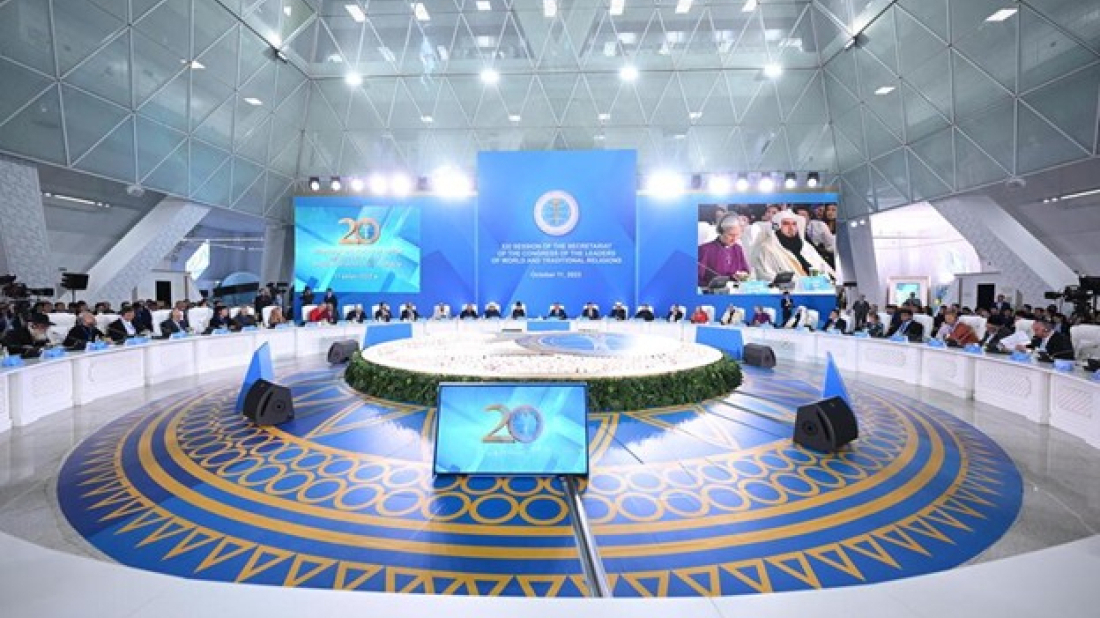Ukraine imposes new sanctions targeting Russian maritime and defence supply chains
Ukraine’s President Volodymyr Zelenskyy has approved new sanctions targeting Russian maritime operators, defence-linked companies and individuals co...

Kazakhstan’s capital will host the 8th Congress of Leaders of World and Traditional Religions on 17 and 18 September. The event will be chaired by President Kassym-Jomart Tokayev and is expected to bring together more than a 100 delegations from around 60 countries.
Participants will include spiritual leaders from Islam, Christianity, Buddhism, Judaism, Hinduism, Taoism, Zoroastrianism, and Shinto, as well as representatives of international organizations, scholars, and public figures. Confirmed attendees include Patriarch Kirill of Moscow and all Russia and Grand Imam of Al-Azhar Sheikh Ahmed al-Tayeb.
The official programme will begin on 16th of September with the 23rd session of the Congress Secretariat, chaired by Senate Speaker Maulen Ashimbayev, and a special session of the United Nations Alliance of Civilizations dedicated to the protection of religious sites.
The main theme of the Congress is “Dialogue of Religions: Synergy for the Future.” During the two days, participants will discuss pressing global challenges and the role of religious leaders in addressing them. The forum will conclude with the Second Forum of Young Religious Leaders, focusing on youth engagement in strengthening interreligious peace.
The Congress holds special significance for Kazakhstan. The country is home to more than 130 ethnic groups and 18 religious confessions. The Congress showcases Kazakhstan’s unique model of peaceful coexistence and interfaith harmony, successfully practiced within its borders. This is not only a domestic message but also an international signal that peaceful dialogue is possible in a multiethnic society.
Furthermore, the forum strengthens Kazakhstan’s international image as a neutral platform for sincere and respectful dialogue between East and West. In a world marked by growing instability and conflicts, Kazakhstan promotes spiritual diplomacy—a form of soft power that enhances its standing on the global stage.
Over the years, the Congress has achieved tangible results. The continuously operating Secretariat and the Council of Religious Leaders ensure the continuity and coordination of initiatives. Joint declarations and appeals adopted at the Congresses have found resonance in the work of the UN and other international organisations. In 2023, a long-term development concept was approved for the Congress, extending to 2033, emphasising youth involvement, digital ethics, and expanded international cooperation.
Quentin Griffiths, co-founder of online fashion retailer ASOS, has died in Pattaya, Thailand, after falling from the 17th floor of a condominium on 9 February, Thai police confirmed.
Ukraine’s National Paralympic Committee has announced it will boycott the opening ceremony of the Milano Cortina 2026 Paralympics in Verona on 6 March, citing the International Paralympic Committee’s decision to allow some Russian and Belarusian athletes to compete under their national flags.
Eric Dane, the actor best known for his roles in 'Grey’s Anatomy' and 'Euphoria', died on Thursday, at the age of 53 after a battle with amyotrophic lateral sclerosis (ALS). His family confirmed his death after what they described as a “courageous battle” with ALS.
An Austrian climber has been convicted of gross negligent manslaughter after his girlfriend died from hypothermia while climbing Austria’s highest peak, the Grossglockner, in January 2025.
President Donald Trump said on Saturday (21 February) that he will raise temporary tariffs on nearly all U.S. imports from 10% to 15%, the maximum allowed under the law, after the Supreme Court struck down his previous tariff program.
Ukraine’s President Volodymyr Zelenskyy has approved new sanctions targeting Russian maritime operators, defence-linked companies and individuals connected to Moscow’s military and energy sectors, according to official decrees issued on Saturday.
Divers have recovered the bodies of seven Chinese tourists and a Russian driver after their minibus broke through the ice of Lake Baikal in Russia, authorities said.
A technical fault in the helium system of NASA’s next-generation moon rocket was announced on Saturday, ruling out the planned March launch window for the Artemis II mission.
President Donald Trump said on Saturday (21 February) that he will raise temporary tariffs on nearly all U.S. imports from 10% to 15%, the maximum allowed under the law, after the Supreme Court struck down his previous tariff program.
Germany's ruling conservatives on Saturday (21 February) passed a motion to ban social media use for under 14s and introduce more stringent digital verification checks for teenagers, building momentum for such limits in Germany and elsewhere in Europe.
You can download the AnewZ application from Play Store and the App Store.

What is your opinion on this topic?
Leave the first comment